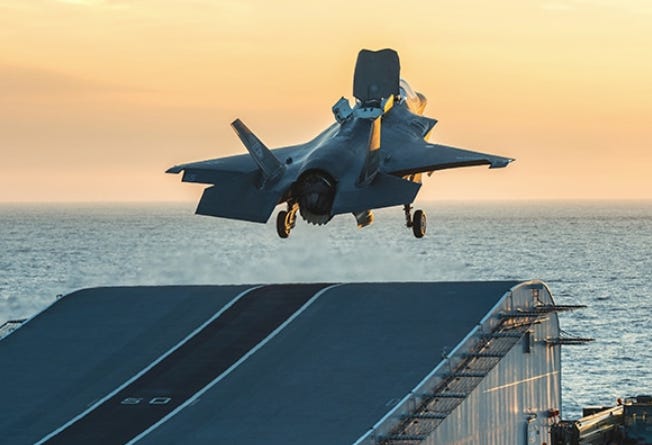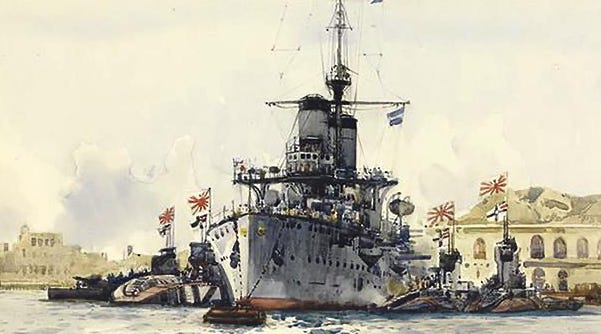How China Will See the Royal Navy's Trip to Asia
An interview with Indo-Pacific expert Alex Neill
Dear all
As many of you will have seen in the news recently, the largest fleet of Royal Navy warships to deploy internationally since the 1982 Falklands War is heading to the Indo-Pacific region next month. HMS Queen Elizabeth’s Carrier Strike Group (CSG) will head through the Suez Canal and then head across to India, South East Asia, East Asia, and finally Oceania, in the largest expression to date of the UK’s pivot to the Indo-Pacific.
The question is, how is China going to take this? Will it enhance or damage the UK’s relationship with Asia? What dangers will the CSG face en route?
Rather than write about this myself, today we’re going to try something a bit different and start what I hope to be a series of interviews with other China-watchers.
Alex Neill is an expert on the geo-politics of the Indo-Pacific and runs a strategic advisory firm in Singapore, as well as being a collaborator at my own firm, MetisAsia.com.
Alex has written widely on China’s maritime ambitions, such as this article for the BBC - “South China Sea: What's China's plan for its 'Great Wall of Sand'” - and this from a few weeks ago, “The very real risks of a dangerous confrontation with China”.
Here is my interview with Alex about the CSG from a couple of days ago; if you agree or disagree please do comment on the article. And remember to like, share and subscribe.
Many thanks for reading
***
SO: Alex - what does the UK intend to achieve from the deployment of the Carrier Strike Group?
AN: The UK wants to achieve two things from the CSG deployment.
The first is to demonstrate Britain’s ability to project power operationally. On that note, the voyage will also serve to test the new carrier’s operational and technical capabilities.
Secondly, the UK wants to show that it has a unity of vision with its friends and allies in the Indo-Pacific in wanting to uphold the existing open international order and rules-based system. It will also demonstrate the UK’s interoperability with its allies. A US and a Dutch ship are joining the fleet and it is anticipated that the CSG will exercise with a number of other navies along the route, for example with those from Australia and Japan.

SO: What does the CSG's inclusion of non-UK boats mean for diplomacy re: China?
AN: The inclusion of non-British ships is to show that the UK has strong togetherness of spirit with its allies in the EU and US. This is a reflection of the diplomatic front being built to uphold the existing world order, which in itself is indicative of the international response against China’s coercive actions.
The inclusion of allied vessels also reminds countries, including China, that military power projection is a tool that the UK can deploy. It shows that the UK has a highly capable military that is able to be deployed to the Indo-Pacific.
It’s important to define what military capability is. China has rolled out hundreds of ships in the last decade and it now has a larger fleet than the US in the Pacific; only a few days ago Xi Jinping went to a southern Chinese naval base and launched three new vessels (a large destroyer, an amphibious assault ship, and a nuclear submarine). But no matter how many ships China can put to sea, this isn’t the same as military capability and effectiveness – being able to deploy lethal force in distant waters. The Royal Navy is showing that it has these capabilities. If you look at China’s current aircraft carriers they are still essentially training vessels, and they know that it will take a while to catchup with the expertise of the Royal Navy. The UK has significant operational experience that China doesn’t have.
SO: How will China take the arrival of the CSG?
AN: Whether on purpose or not, the arrival of the CSG in the Indo-Pacific will coincide with the massive celebrations that Beijing is planning to mark the centenary of the founding of the Chinese Communist Party. As such the presence of the fleet in what China considers its own backyard will be seen as a major irritant. Beijing wants all eyes to be on its celebrations, but instead many will be watching the UK and its allies conduct a huge exercise in force projection nearby.
China is likely to meet the naval manoeuvres with a significant information campaign. This is likely to include a claim that post-Brexit Britain is isolated from its allies, and that it is an insignificant country trying to punch above its weight. We can expect to see parallels drawn with the nineteenth century Opium Wars, which in Chinese minds initiated the century of humiliation that is so important for Beijing’s messaging.
Needless to say, but if the fleet suffers any operational difficulties then it is highly like that the state media will hone in on them.
China is also likely to bring trade into the equation. It will ask how Global Britain can boost its economic connectedness with China when the UK is essentially sabre rattling in China’s neighbourhood.
Aside from offensive action in the media, China may go further and take other measures against the UK. These may even include an extension of the recent sanctions it placed on British politicians.
There will also be diplomatic protests, but whether these are private or public remains to be seen.
SO: What are the scenarios for how the CSG voyage will pan out?
AN: The route of the CSG is all important, and there could be a variety of scenarios panning out along the way.
The first one is what happens when the fleet heads through the Suez Canal and arrives off the coast of Djibouti, the small East African nation at the head of the Red Sea which is now home to China’s first base abroad. We could see Chinese ships head out into the international waters there to meet the Royal Navy, and this might even include China sending ships – maybe even one of its own aircraft carriers – across the Indian Ocean especially to do so. Alternatively, the Royal Navy could engage with a show of force to prove how easy it would be to blockade the Chinese base in the event of deteriorating relations.
The arrival of the fleet in India will be a sign that London is keen to support New Delhi, including in its arguments with Beijing. Given the tragedy of the Covid situation there, the Royal Navy might also be able to conduct some humanitarian assistance and disaster relief in India.
When the CSG arrives in Singapore – where there is an existing Royal Navy facility – it will conduct a series of exercises with its allies in South East Asia. This will show not only the UK’s interoperability with navies there, but also reinforce Britain’s commitment to play a greater role in the region. China, with its increasing influence in South East Asia, will watch these exercises with care.
The next big hurdle for the CSG will be the South China Sea. This stretch of water is claimed by China as its own, and so by just sailing through it the Royal Navy will raise the hackles of Beijing. What will be interesting to see is whether the Royal Navy adopts an American-style Freedom of Navigation operation. In recent years China has occupied a number of reefs and islets in the South China Sea, which the West contests. If the fleet sails within twelve nautical miles of any of these Chinese facilities – the limit of territorial waters in international law – then it will be a symbol that the UK, like the US, does not recognise Chinese sovereignty of these features and maintains that the seas around them are international waters.

Whatever happens, China is very likely to provide a welcoming party for the CSG in the South China Sea with both ships and planes. What is concerning is the scope for an incident that this brings, because of what the US Navy calls “unprofessional seamanship” by the Chinese – remember that most of China’s ships have new crews and do not have the same level of experience as the Royal or US Navies. Any harassment of the CSG by PLAN ships could have unintended consequences if protocols for unplanned encounters are not followed.
After the South China Sea, the fleet will head to Japan and Korea. Here it is likely that the messaging will emphasise the long-standing ties between the UK and thee nations, including the sacrifice Britain made in the Korean War. This in itself is symbolic because Xi Jinping himself has made a lot about how China resisted the West in Korea, and therefore can do so again. The UK has been actively courting military links with Japan for the last fifteen years, and this visit will cap this to emphasise how close the nations now are. This may include reference to the little known support by Japan for the Royal Navy in the Mediterranean in World War I, where Japan suffered naval casualties.
Finally, the CSG will possibly visit Commonwealth nations in Oceania, perhaps including a port call with ANZAC allies.
SO: What could the consequences be for the UK from the CSG’s tour?
AN: The visit is designed to be part of the UK’s new tilt to the Indo-Pacific. It will show that the UK is not just interested in furthering its economic interests there, but that it also cares about the security of the region, and keeping it stable.
Some Asian powers will be reassured to know that the UK means business. It will put the UK on the map in Asia in a way that hasn’t been seen in a long time.


